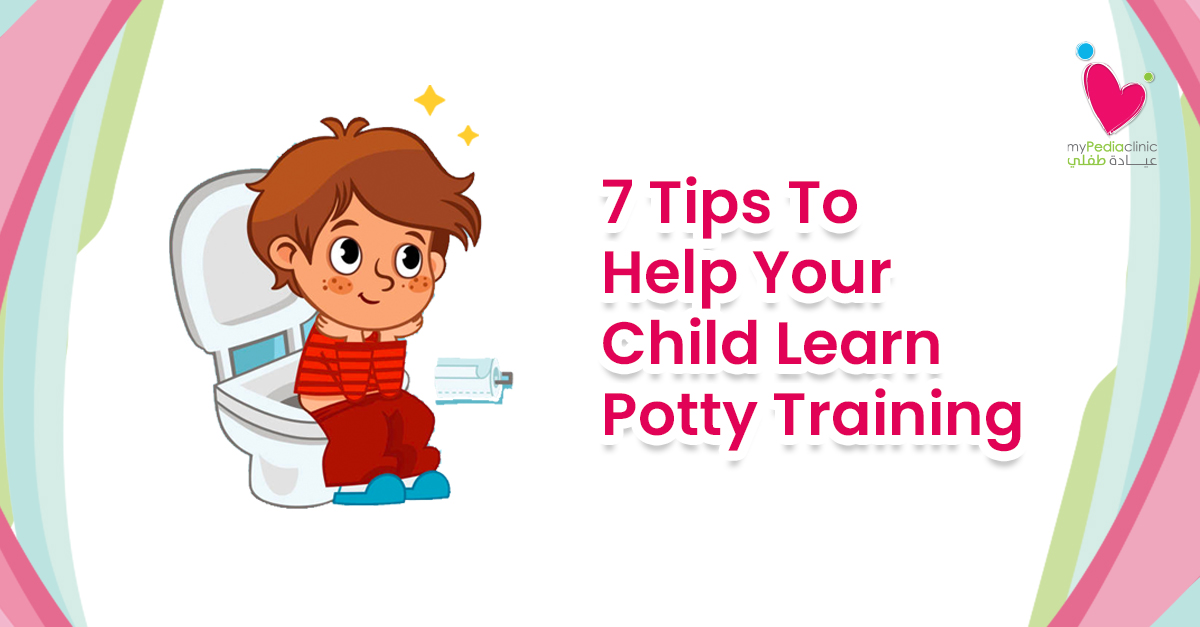Potty Training Tips: 7 Steps to Toilet Train Your Child
Potty training is one of those parenting milestones that seems straightforward—until you’re in the middle of it. Accidents, resistance, regressions, and conflicting advice can make the process frustrating for everyone involved.
Here’s the truth: there’s no single “right” way to potty train. What works for one child may fail miserably with another. But there are proven principles that help most children succeed, and understanding them can save you weeks (or months) of struggle.
At myPediaClinic in Dubai, our pediatricians help families navigate potty training every day. This guide shares our best evidence-based tips for successful toilet training—even with stubborn kids.
When Is Your Child Ready for Potty Training?
The single most important factor in potty training success is readiness. Trying to train a child who isn’t ready leads to frustration, power struggles, and delays.
Signs of Physical Readiness
- Staying dry for longer periods: Can stay dry for 2 hours or more, or wakes up dry from naps
- Predictable bowel movements: Has bowel movements at roughly the same time each day
- Awareness of elimination: Shows signs of knowing when they’re urinating or having a bowel movement (pausing, squatting, going to a corner)
- Physical ability: Can walk to the bathroom, pull pants up and down, and sit on the toilet
- Dislikes wet diapers: Shows discomfort when wet or dirty and wants to be changed
Signs of Cognitive Readiness
- Can follow simple instructions: Understands and follows 2-step directions
- Understands “potty” words: Knows words like pee, poop, potty, wet, dry
- Can communicate needs: Can tell you or signal when they need to go
- Shows interest in the toilet: Curious about the bathroom, wants to watch others, interested in underwear
Signs of Emotional Readiness
- Desire for independence: Wants to do things “by myself”
- Cooperative phase: Generally willing to please and follow directions (not in peak defiance)
- No major life changes: Timing isn’t during a move, new sibling, starting daycare, or other stressful transitions
What Age Is Normal?
Most children show readiness signs between 18-24 months, but the typical age range for successful training is 2-3 years. Some children aren’t ready until closer to 4, and that’s okay.
Children trained later often learn faster than those pushed early. Waiting for true readiness usually means fewer accidents and less frustration.
7 Steps to Successful Potty Training
Step 1: Introduce the Potty
Before formal training begins, let your child become familiar with the potty.
- Let them pick out a potty chair (or a seat that goes on the regular toilet)
- Place it in the bathroom and let them sit on it fully clothed
- Read books about potty training together
- Let them watch you or siblings use the toilet (if comfortable)
- Use consistent language for body functions
This introduction phase can last a few days to a few weeks. No pressure—just familiarity.
Step 2: Create a Routine
Start having your child sit on the potty at predictable times:
- First thing in the morning
- After meals
- Before bath
- Before leaving the house
- Before bed
Keep sessions brief—just a few minutes. If nothing happens, that’s fine. The goal is building the habit of sitting regularly.
Step 3: Teach the Connection
Help your child understand what’s supposed to happen on the potty:
- When changing diapers, talk about what’s in them: “You made pee! Pee goes in the potty.”
- Empty dirty diapers into the toilet and let your child flush (if they’re not scared of flushing)
- If your child has predictable bowel movement times, try sitting them on the potty then
- Celebrate any success—even accidental—enthusiastically
Step 4: Make the Transition
When your child is regularly succeeding on the potty (even occasionally), you’re ready to transition out of diapers during the day.
The approach:
- Switch to underwear or training pants during waking hours
- Go to the potty every 1-2 hours, plus at routine times
- Make going to the potty easy—loose clothing, accessible bathroom
- Stay home or close to home for the first few days if possible
Some parents prefer:
- Cold turkey: Straight to underwear, no pull-ups. This works well for children who are very ready and motivated.
- Gradual transition: Pull-ups during outings and naps, underwear at home. This works well for children who need more time.
Either approach can work—choose what fits your child and family.
Step 5: Handle Accidents Calmly
Accidents WILL happen. They’re a normal part of learning. How you respond matters:
- Stay calm: No anger, scolding, or punishment. Ever.
- Clean up matter-of-factly: “Oops, you had an accident. Pee goes in the potty. Let’s clean up.”
- Involve your child: Have them help (appropriately for age) put wet clothes in the hamper
- Remind without nagging: “Remember to tell me when you need to go potty.”
- Don’t shame: Comments like “You’re such a big kid now, you shouldn’t have accidents” are counterproductive
If accidents are very frequent (more than they’re succeeding), consider whether your child is truly ready or if you need to scale back.
Step 6: Address Challenges
Common potty training challenges and solutions:
Refuses to Sit on the Potty
- Don’t force it—this creates negative associations
- Make it fun: books, songs, special “potty toys” only used during bathroom time
- Try a different potty (some kids prefer the big toilet, others their own seat)
- Back off for a week or two if resistance is strong
Pees but Won’t Poop on the Potty
This is extremely common. Many children master urination months before bowel movements.
- Continue having them sit after meals when bowel movements are most likely
- If they ask for a diaper to poop, give it—and have them wear it in the bathroom
- Gradually transition: diaper in bathroom → diaper on potty → no diaper
- Address constipation if present (hard stools make the potty scary)
- Be patient—this often just takes time
Scared of the Toilet
- Use a child-sized potty chair instead of the big toilet
- If it’s the flush that scares them, don’t flush until they’ve left the room
- Let them flush toys or toilet paper to demystify it
- Never force a scared child to sit
Frequent Regressions
Setbacks are normal, especially during:
- Illness
- Major life changes (new sibling, moving, starting school)
- Travel or disruption to routine
- Developmental leaps
Stay calm, go back to basics (more frequent reminders, closer supervision), and remember that progress isn’t always linear.
Step 7: Tackle Nighttime Last
Daytime and nighttime dryness are controlled by different developmental processes. Most children achieve daytime dryness long before nighttime.
- Keep using diapers or pull-ups at night even after daytime training is complete
- Nighttime dryness often doesn’t happen until age 5-7 (and later for some children)
- Waking up dry consistently (for a month or more) signals readiness to try nighttime training
- Limit fluids close to bedtime and have your child use the toilet right before bed
- Use a waterproof mattress protector
Bedwetting in children under 7 is developmentally normal. Don’t punish or shame—the child can’t control it.
Dos and Don’ts of Potty Training
Do:
- Wait for readiness: Pushing too early backfires
- Stay positive: Praise efforts and successes warmly
- Be consistent: Same approach at home, daycare, grandparents’ house
- Dress for success: Easy-on, easy-off clothes (no overalls or complicated buttons)
- Keep the potty accessible: If you’re in a large house, consider potties on multiple floors
- Celebrate milestones: First successful pee, first poop, first dry day, first dry week
- Be patient: Average time to train is 3-6 months—it’s a process
Don’t:
- Punish accidents: This creates fear and shame, not success
- Compare to other children: Every child develops at their own pace
- Use negative language: “You’re still in diapers like a baby” hurts more than helps
- Start during stressful times: Major transitions aren’t ideal training periods
- Nag constantly: “Do you need to go potty?” every 5 minutes creates power struggles
- Rush the process: Trying to train in a weekend often doesn’t work
- Give up too quickly: Some setbacks are normal; persistence (with flexibility) pays off
Potty Training Incentives: Do They Work?
Reward systems can help—but use them thoughtfully.
Effective Incentives
- Sticker charts: Visual progress that children can see
- Small immediate rewards: A single candy, special sticker, or small toy for successes
- Praise and celebration: Genuine enthusiasm goes a long way
- Special underwear: Letting your child pick underwear with favorite characters
Tips for Using Rewards
- Reward the behavior (trying, sitting, telling you), not just success
- Keep rewards small so you can give them frequently
- Phase out rewards gradually once the habit is established
- Don’t use rewards as bribes during resistance (“If you go potty, you can have ice cream”)
When Rewards Don’t Work
If incentives aren’t helping, your child may not be ready, or there may be underlying issues (constipation, anxiety, power struggles). Sometimes taking pressure off works better than adding rewards.
When to Seek Help
Most potty training challenges resolve with time and patience. Consult your pediatrician in Dubai if:
- Your child is over 4 and showing no progress despite consistent effort
- Your child was trained but has significant regression lasting more than a few weeks
- There’s pain with urination or bowel movements
- Constipation is chronic
- Your child is withholding stool (refusing to poop for days)
- Daytime wetting persists past age 5-6
- You’re concerned about a medical issue
- The process is causing significant family stress
Frequently Asked Questions About Potty Training
What’s the best age to start potty training?
Most children are ready between ages 2-3, but readiness varies widely. Look for readiness signs rather than a specific age. Starting too early often extends the process; starting when truly ready usually means faster success.
Should I use pull-ups or go straight to underwear?
Both approaches work. Pull-ups offer convenience and less mess but may feel too similar to diapers. Underwear creates more urgency to stay dry but means more accidents. Choose based on your child’s readiness and your situation.
How long does potty training take?
For most children, expect 3-6 months from start to reliable daytime dryness. Some children train in weeks; others take longer. Nighttime training often takes additional months or even years.
My child hides to poop. What should I do?
Many toddlers prefer privacy for bowel movements. This shows awareness—a positive sign! If they’re hiding to poop in a diaper, try having them do it in the bathroom (even if still in the diaper). Gradually transition to the potty.
Is it normal for my child to be scared of the toilet?
Yes. The big toilet can seem scary—loud flushing, fear of falling in, or just unfamiliarity. Use a child-sized potty, let them observe without pressure, and never force a scared child to sit.
Why does my child have accidents only at daycare?
Different environment, distractions, bathroom setup, or caregiver approach can affect success. Communicate with caregivers about your home routine and ensure consistency. Accidents in new environments are common during training.
Should I wake my child at night to use the toilet?
This isn’t usually necessary for typical development. If your child wakes up dry consistently, nighttime training may be progressing naturally. Scheduled night wakings can disrupt sleep for marginal benefit—most children develop nighttime dryness on their own timeline.
My child was trained but is having accidents again. What happened?
Regressions are common during illness, stress, major changes, or developmental shifts. Stay calm, return to basics (more reminders, easier clothing), and wait it out. If it persists beyond a few weeks without clear cause, consult your pediatrician.
Can I potty train my child in a weekend?
Intensive weekend training works for some children who are very ready and motivated. But for most, it’s the beginning of a process, not a complete solution. Be prepared for continued reinforcement afterward.
How do I potty train boys vs girls?
The process is similar. Boys typically start sitting for both pee and poop, then learn to stand for pee later (usually by watching dad or older brothers). Girls may train slightly earlier on average, but individual variation is huge.
What if my child won’t poop on the potty?
This is one of the most common challenges. Don’t force it. Offer the diaper but have them use it in the bathroom. Check for constipation. Be patient—most children eventually make this transition, even if pee training happened months earlier.
Are training pants the same as pull-ups?
Pull-ups are disposable training pants (like diapers you pull on). Training pants can also refer to thicker cotton underwear designed for training. Cotton training pants let children feel wetness more than pull-ups, which some believe speeds training.
What should I do if grandparents use a different approach?
Consistency helps. Share your approach with all caregivers. If small variations exist, most children can adapt. Major differences (like punishment for accidents when you don’t punish) should be addressed directly.
Potty Training Success Starts with Patience
Potty training is a developmental milestone—not a test of parenting skill. Some children breeze through it; others struggle. Most fall somewhere in between.
The keys to success: watch for readiness, stay positive, handle accidents calmly, and be patient. Your child will get there.
If you’re struggling with potty training or concerned about your child’s progress, the pediatric team at myPediaClinic can help. We address training challenges, rule out medical issues, and support families through this milestone.
Book an appointment with our pediatric specialists today.





